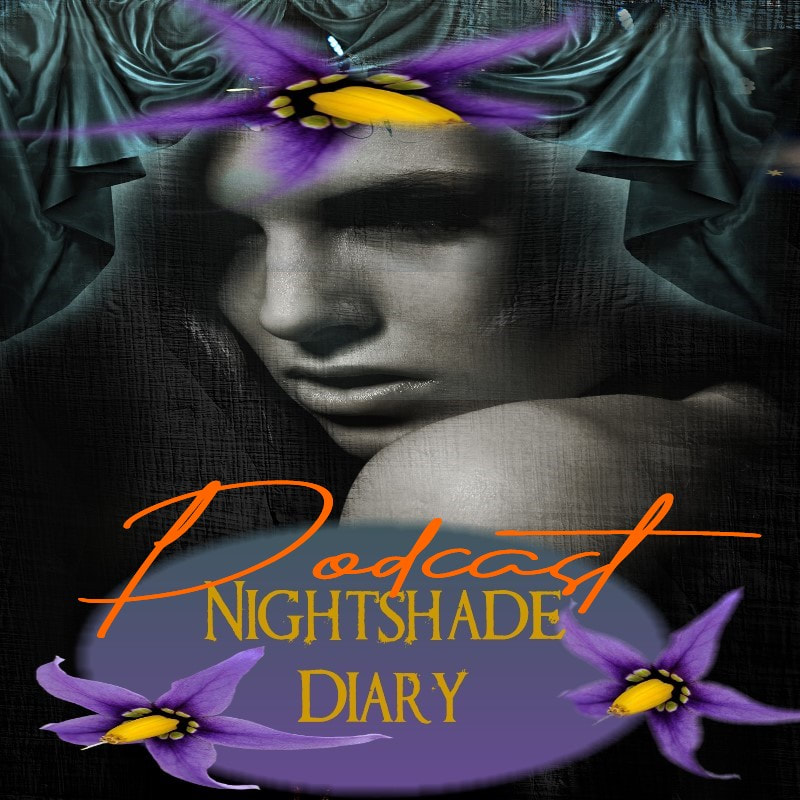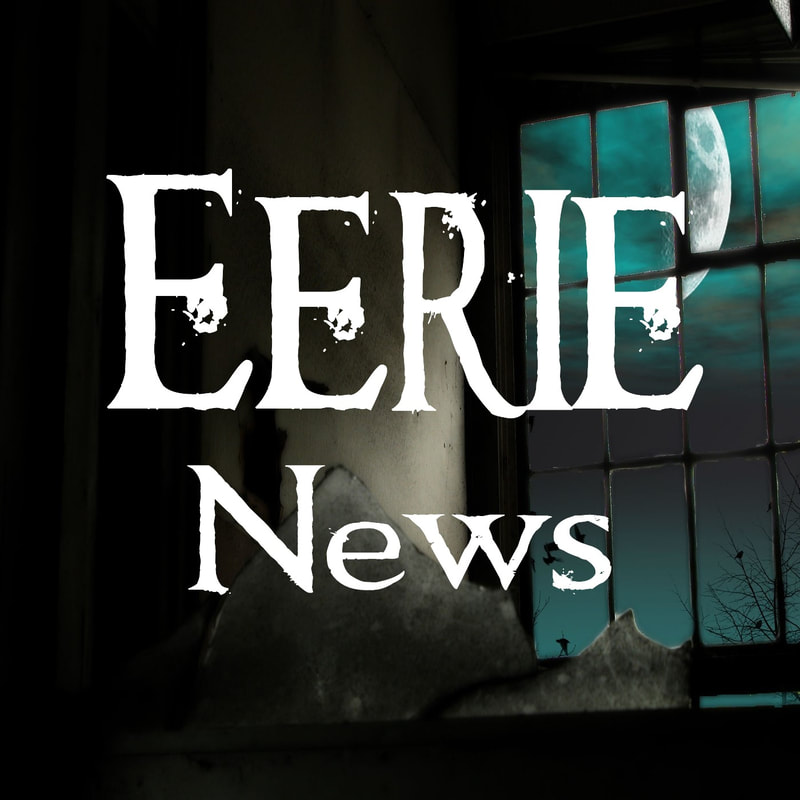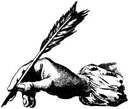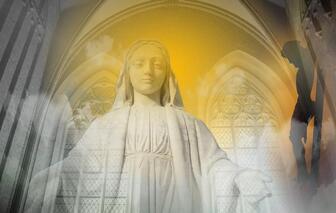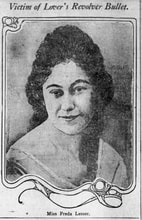 By M.P. Pellicer | Stranger Than Fiction Stories When Freda Lesser was murdered in 1919, there was a comparison made to the killing of Freda Ward in 1897, not only because of their name, but because they were slaughtered over love. 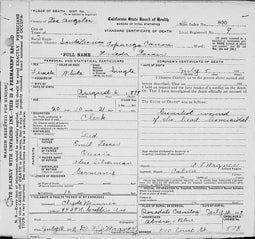 Freda Lesser's death certificate c.1919 Freda Lesser's death certificate c.1919 In July, 1919, the murder of a girl made the newspapers. Mostly because she was the victim of "morbid love" and that her name was Freda. Her full name was Freda (Frieda) Lesser and she was killed by Harry New, because she refused to marry him, or at least that's the reason her murderer gave for putting a bullet through her brain. He killed her in Topanga Canyon, and after the deed drove around with her corpse in the car, until he went to the police station in Los Angeles and surrendered himself with a full confession. Harry S. New Jr. claimed to be the common law son of U.S. Senator Harry S. New of Indiana. When the scandal of the murder made the newspapers Lillie Scudder Burger, his mother said she had divorced Senator New 18 years before, and that she had moved to Los Angeles. The senator's response was: "The only thing I care to add is that the statements from any source that Mrs. Burger and I were ever either married or divorced at any time, or under any name is absolutely untrue." 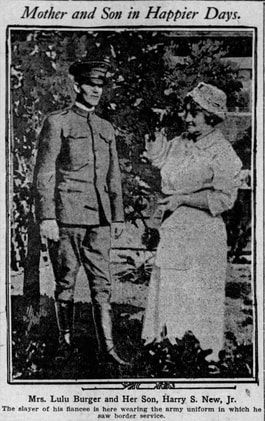 Harry New with his mother while he was in the military c.1916-1918 Harry New with his mother while he was in the military c.1916-1918 In his initial confession Harry New said that after taking his sweetheart for an automobile ride for several hours, he killed her believing she was pregnant with his child. They had quarreled over the fate of the child and the date of the coming wedding, which was supposedly only a few days away. They stopped at Topanga Canyon, and when she leaned over to rest her head on his shoulder, he shot her dead with a revolver whipped from the side pocket of the automobile. It was immediately ascertained by the coroner that Freda was not pregnant. When told this information he sobbed and beat his head against the bars until the jailers were forced to restrain him. He said, "I thought that Freda was going to become a mother, and she told me that she didn't want the child and refused to become a mother, so I shot her to keep her from what she meant to do, and now you tell me it was all a lie! I did what, at the time, I thought was right. I wanted to save her from what I thought she was going to do. I am ready to pay the price for my act." Harry New lived with his mother, and he had met Freda Lesser 6 months before at a furniture factory where they both worked. He was a truck driver and she was a stenographer. He had served in the army and enlisted with Battery A and went down to the Mexican border. He made corporal, however he contracted tuberculosis and he had to leave the military 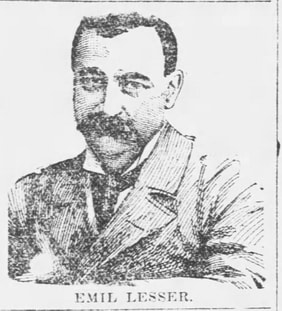 Emil Lesser c.1896 Emil Lesser c.1896 Freda was the daughter of Emil Lesser, a Latvian émigré and proprietor of the St. George Hotel. He was a veteran of the Franco-Prussian war of 1870. He immigrated to America and settled in Birmingham, Alabama where he acquired a great deal of property. Lesser was an intrepid businessman who belonged to different organizations in Birmingham. He was the Chancellor Commander of Germania Lodge No. 119. He was also on the committee of the German Democratic Club of Birmingham, and owned the Metropolitan Hotel. In 1893, his first wife Freda (née Silberman) died from pneumonia and heart failure. She was 28 years old. He married his second wife Alice in 1896, and they had Freda in 1899, which they named after Emil's first wife. Emil Lesser started working with the Mardi Gras carnival organizers in New Orleans, and by 1897 the Birmingham Carnival Society was organized, which had their own parade. Emil was the president of the society. The family was well off and in 1907, Emil with his wife and daughter were touring Europe. For all the success that Emil Lesser had when living in Alabama, his luck turned when he came to Los Angeles. In 1912, he still had business interests in Birmingham, but had bought the St. George Hotel, and lived there with his family. In June, the structure caught fire and 3 people died in the blaze. Emil, his wife and daughter had to jump from a second story window to escape the fire. His wife Alice broke her arm, shoulder and two ribs. 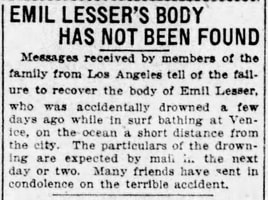 Emil Lesser disappeared and was reported to have drowned in the ocean c.1915 Emil Lesser disappeared and was reported to have drowned in the ocean c.1915 It wasn't until 1914 that the Lessers sold their home in Alabama, and moved permanently to California. In the fall of 1915, Emil Lesser mysteriously drowned. He was known to have a weak heart, and two weeks before his disappearance, his doctor told him to stop bathing in the ocean. His clothing was found in a room in the Venice bathhouse. Since he was a punctual man, his family who lived at 752 East Adams Street became alarmed when he didn't arrive for supper. He had last been seen by the bath attendants around 2 p.m.. Police combed the beach and sent out swimmers, but they didn't find any trace of the missing man. His doctor was convinced he suffered a heart attack. He was never found, and none would have believed that less than 4 years later his daughter would join him in the hereafter. The life insurance companies in which he was heavily insured, refused to pay indemnities without absolute proof of his death. Four suits were begun but the cases dragged along through the courts. The insurance companies contended Lesser had cause to disappear, since he was under surveillance by United States authorities as a suspected member of a group of German spies, and also in connection with a murder case in Alabama. 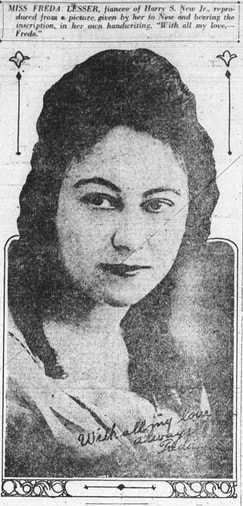 Picture of Freda Lesser taken shortly before her death c.1919 Picture of Freda Lesser taken shortly before her death c.1919 Within a day of Freda's murder, Harry New declared he would plead temporary insanity and throw himself on the mercy of the court. He said, "I'm not afraid of death, I'm only afraid of one thing and that is to face my mother." His mother had been visiting on the East Coast, and was heading back to Los Angeles after hearing of the crime. Now he changed the reason for the shooting saying she refused to marry him, despite being pregnant with his child. The detectives then turned to a nurse, who New said turned Freda against him by promising to relieve her condition of approaching motherhood. The nurse when interviewed flatly refused New's story. Then Mr. Claypool, an attorney friend of New's mother, proposed another motive for the murder. He said that New had once discussed with him the unfortunate circumstances of his birth, in that he was illegitimate, and that if he ever married anyone he would tell the girl the truth of his birth. Did he tell Freda the truth only days before their marriage, and she changed her mind? The autopsy performed on Freda, again confirmed that she was not pregnant. Freda's mother also insisted that her daughter was still a virgin. 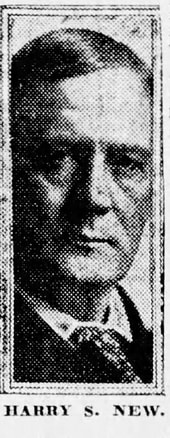 Harry's supposed father was a senator from Indiana who later became Postmaster of the United States. c.1923 Harry's supposed father was a senator from Indiana who later became Postmaster of the United States. c.1923 By the end of July, New's attorneys were planning to use the case of Gladys Dunn who was sentenced to a year in the house of correction in Massachusetts for the murder of her 3-year old son as legal precedent, demanding that a manslaughter verdict be included with the blank verdict paper given the jury . Dunn got lenience, because it was held she was temporarily insane when she shot her son. Eventually New was charged with murder in the firs degree. His defense team said their position would be that "no admission will be made that New fired the fatal shot and, at the same time it will be contended that he was irresponsible when he made his confession." The inference was that he had not killed her, and she had committed suicide. In December when the case came to trial, Edna Clancy New's younger half sister, told the court that unwittingly and unintentionally she precipitated the tragedy. She said, "I told Freda a few days before the shooting that Harry should never marry; that he was not fitted to have a wife and a home, and Freda agreed with me after she had heard all." She said she had gone first to Harry to tell him to realize the hopelessness of his plans to marry Freda, and said that Harry never mentioned that Freda was pregnant. He flew into a fury and stormed away, declaring he would marry Freda at once. Edna then went and spoke to Freda about Harry's past, rather then see their lives ruined. She convinced Freda to postpone the marriage until her mother returned from her trip from the east. She said, "I introduced Harry to Freda at the place where we all worked. We all liked Freda. He seemed to fall in love with her at first sight. They started to go together, and I did not think much of it, until they began to talk of getting married. Then I talked to Harry and tried to get it out of his head. He wouldn't listen and I went to Freda. I told her she shouldn't marry him because he had been insane, and was incapable of providing for her." Edna Clancy told how her brother used to come to his mother time after time up until very recent years and ask: "Why doesn't father take us home to live with him?" The mother would reply, "That would be impossible, Harry; your father is married." 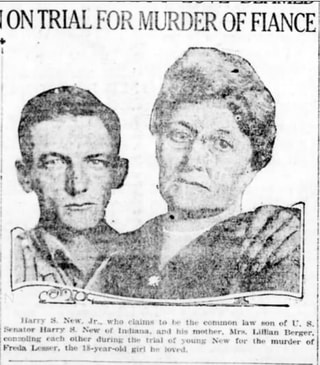 Harry New Jr. and his mother Lillie Mae Burger c.1919-1920 Harry New Jr. and his mother Lillie Mae Burger c.1919-1920 Jail attendants, trusties and newspaper reporters who had contact with Harry New since his arrest came to the witness stand, and described behavior that caused them to believe that New was irrational or insane. Deputy Sheriff Catlin described four incidents. In one he found Harry New sitting up in bed one night laughing. When he asked what he was laughing at, New said it was nothing. On three occasions he found New in bed at night with his clothing on, and the covers pulled over him. He had to tell him to get up and take his clothes off. He believed fellow prisoners who told him his pet jail cat had been cooked and served as Belgian hare. He cried until he was told it wasn't true. Another incident involved a fight between two prisoners, where he seemed uninterested and walked about as if nothing was going on. When the sheriff was asked if New was feigning insanity he replied: "If he was, he was feigning for a long time. I think New is more insane than many men who have gone from the jail to Patton." Nat Ledford who was acquainted with New said that in 1911 and in 1916, he too found him in bed with all his clothing on, including his shoes. New had explained this behavior by saying he wanted to be ready to leave in a hurry, as some men had been following him ever since he left the border, where he served in the Indiana National Guard field artillery regiment. Ledford said New quit his job at Riverside, because he said the men were following him. Another acquaintance of Harry New named Stephen Kessler said that he had an extremely bad temper. He said, "If New got mad, he would be likely to pick up a club or a rock and hit the person he was angry at, without stopping to think it over." Another jail attendant Deputy Sheriff Rogers said "I think New was off of his base, a man of unsound mind. I believe that he is insane." Other jail attendants testified that they observed New standing in the hallway as if bewildered, with no idea of where to go. Another attendant also found him in bed at night with his clothing on . He had asked New what he thought of the jury, and New responded, "I haven't had time to think about it. I have been too busy." This was a very strange reply, because on the contrary, there was nothing to occupy the prisoner. A newspaper reporter said that New did not seem to realize the position he was in . A trustie said he found New hiding one night under a cot, and that New said people "from Texas were after him." During the trial alienists said New's mind was comparable to an 11-year old, and that he suffered from hallucinations and heard mysterious voices speaking to him out of thin air. 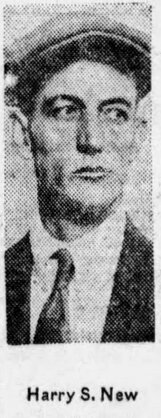 Harry New c.1926 Harry New c.1926 Harry New was convicted of second degree murder, and was sentenced to ten years to life imprisonment set to to be served at San Quentin. His prisoner number was 33406. In April, 1920, Harry New insisted on his innocence saying that Freda killed herself, but he didn't want a new appeal and trial, stating that he wanted to protect his mother and sister from further humiliation. Lillie Mae Burger believed her son had received a spiritual message, which has caused him to place his trust in God and that "God will eventually open the prison gates to him." Despite his protests, his attorneys did present an appeal, which was dismissed in three months after his conviction by the district courts. On October 5, 1922, Alicia Lesser, Freda's mother died at the age of fifty. This was the end of the Lesser family. Perhaps his attorneys thought that with the death of Mrs. Lesser, there would be no opposition to Harry New's application for commutation of his sentence. It was denied. Four years later his sister once more made another effort to have Governor Friend Richardson pardon him. It was not granted. In 1930, it was determined that Harry New must serve 36 years, with the last 10 years to be on parole. He worked in the prison as the chauffeur for Warden James Holohan. In July 1931, Harry New was released on parole after serving 11 years and 4 months. He went to live with his mother who owned a chicken farm in the San Fernando Valley. Throughout the years, his father would declare to the newspapers that he had never had a relationship with Lillie Mae Burger, and that Harry was not his son. 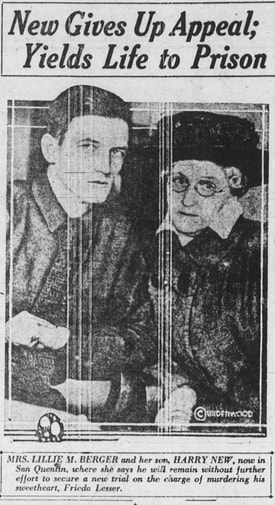 Harry New with his mother Lillie May Burger when he was appealing his conviction c.1920 Harry New with his mother Lillie May Burger when he was appealing his conviction c.1920 Harry's mother, Lillie May Burger died on March 28, 1939, at her home at 15560 Sherman Way, Van Nuys. Strangely in her obituary she was listed as the mother of Edna May and Harry Clancy. Lillie May Scudder, as she had once been known, had led a mysterious life. Much of it was explained during the preparation for Harry's trial. Once they knew the whole story, the defense team gave up the idea of having Mrs. Burger take the stand in order to avoid a scene. Their decision was based on a previous deposition, where there was a discussion that insanity was alleged to have existed in Lillie Burger's family of origin for a few generations. The one who supplied the information was her sister, Martha E. Scudder. She said their father Edward Scudder had been committed to an asylum for the insane. She described one time when an alarm for fire had sounded out at their home. She said her father jumped from the top to the bottom of a long flight of stairs, and ran outside leaving everyone behind, which included his young children. Martha described that her sister was irrational at times as well, even though she had never been examined by an alienist. Lillie May was born in 1860, and she first married John Gund. It was during these years when Lillie had her affair with Harry New. She had given birth to a son named Stewart New who died in infancy. She then had Harry in 1888. It seemed that Lillie's family were aware of the relationship, and called the boy Little Harry and his father Big Harry. Where was Lillie's husband John Gund during this time is unknown. Lillie Mae resurfaced on September 29, 1897, when she was 37 years old. She married James Clancey (Clancy) who was eight years younger than her. Her name on the marriage certificate was Lillie May Gund. Like Harry, there was no birth certificate for her daughter Edna Mae Clancy, who was born nine months before her parents married. Strangely James Clancey died two months after the marriage in December, 1897, under unknown circumstances. By the 1900 census, Lillie May Clancey was living in Los Angeles in a boarding house on South Hill Street with her two children. 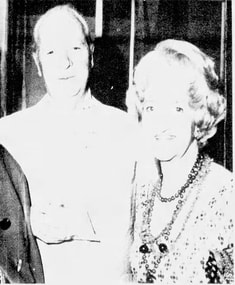 Edna May with her husband Charles Aufferth in Palm Springs, CA c.1975 Edna May with her husband Charles Aufferth in Palm Springs, CA c.1975 On July 3, 1907, Lillie married Samuel D. Burger in Oklahoma. Like James Clancey, her husband was nine years younger than her. In 1910, they were still married and he worked as a traveling salesman for a hardware company. However within the next ten years, the marriage had soured and they parted ways. In the 1920 census, Lillie May identified herself as a widow, when in reality she was a divorcee, which carried at stigma. Her daughter Edna lived with her. Samuel Burger, Lillie's ex-husband sought happiness with another woman. On October 11, 1922, he married Emma Mae Tranter, 12 years younger than him, and they lived in Los Angeles. They had a daughter Bettie Mae, however he died in 1930. Edna May Clancey, whose unwise but good intentions seemed to have precipitated Freda's murder, outlived everyone. She died in 1987 at the age of 90. She married three times like her mother. Her first husband was John M. Hayes on April 12, 1914. She married Charles J. Aufferth on September 1, 1961, however her surname was Butler, which indicates there was a second marriage to an unknown man. She never had any children. Freda Lesser's story unfolded against a backdrop of insanity, espionage and infidelity, and ended with murder. The question begs to be asked: did Harry New kill his fiancée in a moment of insanity, or did he cold-bloodedly decide that if Freda couldn't be his, she would belong to no one? Sources - Birmingham State Herald, The Desert Sun, The Los Angeles Times, Hollywood Citizen News, Southwest Wave, Oakland Tribune, Sacramento Bee, Birmingham Age, San Francisco Examiner, Birmingham News
0 Comments
Your comment will be posted after it is approved.
Leave a Reply. |
Stranger Than Fiction StoriesM.P. PellicerAuthor, Narrator and Producer Archives
July 2024
Categories
All
|
Stories of the Supernatural
- Stories of the Supernatural
- Miami Ghost Chronicles
- M.P. Pellicer | Author
- Stranger Than Fiction Stories
- Eerie News
- Supernatural Storytime
-
Astrology Today
- Tarot
- Horoscope
- Zodiac
-
Haunted Places
- Animal Hauntings
- Belleview Biltmore Hotel
- Bobby Mackey's Honky Tonk
- Brookdale Lodge
- Chacachacare Island
- Coral Castle
- Drayton Hall Plantation
- Jonathan Dickinson State Park
- Kreischer Mansion
- Miami Biltmore Hotel
- Miami Forgotten Properties
- Myrtles Plantation
- Pinewood Cemetery
- Rolling Hills Asylum
- St. Ann's Retreat
- Stranahan Cromartie House
- The Devil Tree
- Trans-Allegheny Lunatic Asylum
- West Virginia Penitentiary
- Paranormal Podcasts
"When misguided public opinion honors what is despicable and despises what is honorable, punishes virtue and rewards vice, encourages what is harmful and discourages what is useful, applauds falsehood and smothers truth under indifference or insult, a nation turns its back on progress and can be restored only by the terrible lessons of catastrophe."
- Frederic Bastiat
- Frederic Bastiat

Copyright © 2009-2024 Eleventh Hour LLC. All Rights Reserved ®
DISCLAIMER
DISCLAIMER
 RSS Feed
RSS Feed


